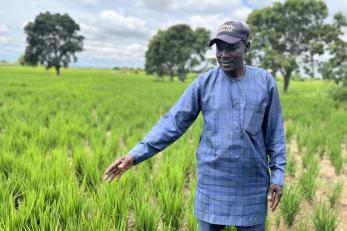Sprouting seeds for resilience and peace building
Rural Resilience Activity partners with Asma’u Memorial Farm

“I am from Sukur Kingdom, a World Cultural Heritage Site and Africa's first Cultural Landscape'', Phillip Emanuel tells us proudly and reminiscently. He was forced to leave his home in 2014, when the jihadist insurgents invaded his community and forced his family to flee for their lives. “We spent 7 days in the bush, getting no food but leaves”, Phillip recounts. Their refuge ultimately led them to Yola, where Phillip’s brother provided shelter for his family. It was during this tumultuous period that Phillip first heard of Asma’u Memorial Farm.
Asma’u Memorial Farm is an agriculture-focused enterprise with a 400-hectare farm that extends a lifeline to internally displaced persons (IDP) through an outgrower farming scheme - a system that links networks of unorganized smallholder farmers with domestic and international buyers. Asma’u assists IDP farmers by leasing them sections of the land, typically one hectare each, and even provides support in the form of agricultural inputs like seeds and fertilizers on a loan basis. Upon harvest, farmers sell their output to Asma’u where they and Asma’u split the profit, creating a mutually beneficial arrangement. Yet, Phillip acknowledges that while he remains grateful for Asma’u's generosity in affording him a chance to farm anew in a foreign environment, he faced challenges to provide for his family of 1 wife and 5 children.
Phillip’s story is not unique. Over 2 million people are still internally displaced in Nigeria, many of whom are struggling with poverty, food shortages and malnutrition to this day. The Feed the Future Nigeria Rural Resilience Activity (RRA) funded by USAID, partners with various key market players to combat such vicious cycles of poverty and hunger through innovative business models, especially in vulnerable, conflict-affected areas of Northeast Nigeria. Implementers of this activity, Mercy Corps, in partnership with the International Fertilizer Development Center and Save the Children International, partnered with Asma’u to expand their outgrower scheme by enabling more IDPs to become seed outgrowers for Asma’u and training them on seed production as well as sustainable agricultural practices.
“So much has changed since the partnership with RRA”, Phillip says. He learned to separate seeds from grain and now gains additional income as a seed entrepreneur by cultivating climate-resilient seeds in addition to rice and maize. Within just a year and a half, Phillip has managed to increase his income through additional seed production by 50%, from N 200,000 ($260) to N 300,000 ($400). This financial boost has enabled his family not only to cover school fees and put three square meals on the table but also to establish a small kiosk for selling medication, diversifying their income sources, and enhancing resilience against unforeseen challenges.
Furthermore, the partnership with RRA trained him to become a trainer, sharing with people good agricultural practices and seed production knowledge. Phillip has already trained 75 farmers within the Asma’u community, in the hope that they could gain access to the much-needed income from enhanced productivity and seed multiplication too.
My goal is to become a great farmer and to bring peace to my home of Sukur Kingdom
Phillip Emanuel, Farmer and seed entrepreneur
Phillip is not only a farmer; but a conflict resolution specialist. He used the additional income from seed production to pursue a master’s degree in peace and conflict resolution. “(Because of the insurgency,) At the village, people do not trust each other. Your friend could be the one who slaughtered your wife. It made me question how we can live in union in such an environment”, Phillip says.
When asked about what he gained through the partnership between Asma’u and RRA, Phillip emphasized practicality. He sees himself as someone who brings theory and knowledge to the actual practice of farming and conflict resolution, and RRA provided him with the training and education he needed to do so.
His determination to improve his farming business while pursuing higher-degree education has inspired his children too, as they now want to follow in his father’s footsteps to continue their education. “It feels very, very okay”, Phillip says with a shy smile.
This collaboration has brought benefits to both small-scale farmers like Phillip and large-scale sellers like Asma’u, leveraging the outgrower scheme. Additionally, it has helped countless more to thrive despite the recent climate shocks by making over 3,000 metric tons of climate-resilient seeds available in the market.